From Uganda to Sonora: Harunah Damba’s Global Journey as a Disability Advocate
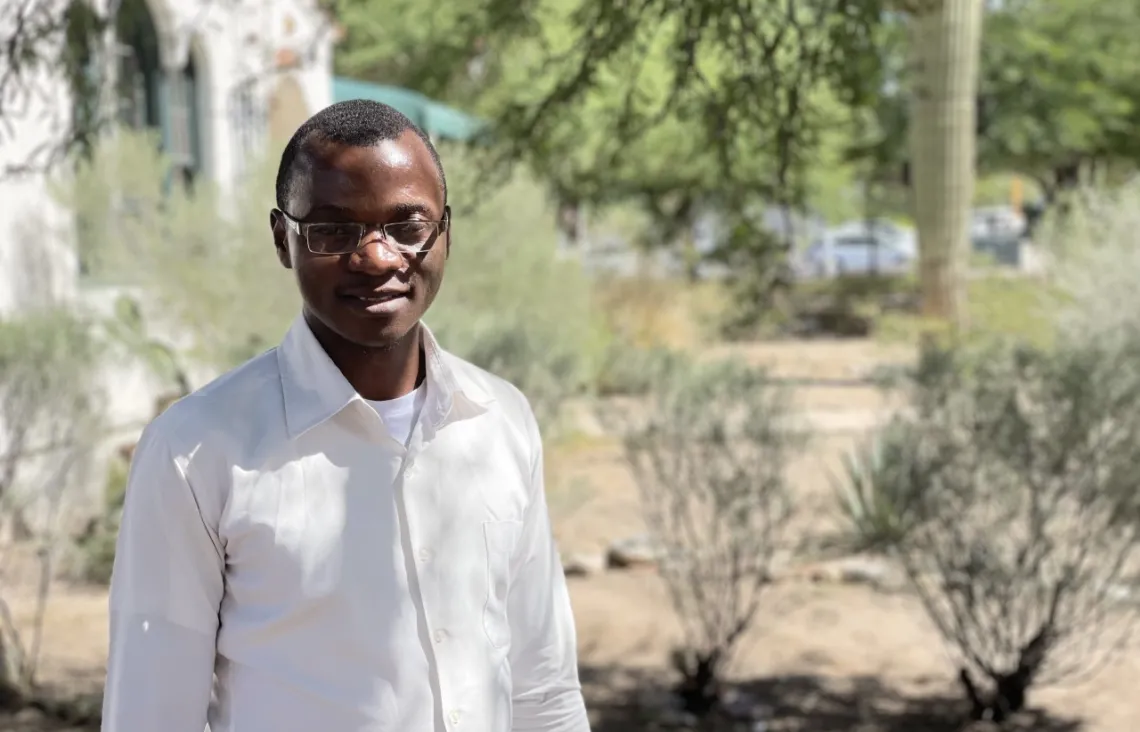
In early October, the University of Arizona Sonoran Center for Excellence in Disabilities welcomed Harunah Damba from Uganda as part of the U.S. State Department’s Professional Fellowship on Inclusive Civic Engagement. Harunah is the chairperson of United Persons with Disabilities, an aid and advocacy organization for people with disabilities in Uganda.
We had the opportunity to sit down with Harunah and discuss the extraordinary series of events that led him here, how his time here will help him and his organization, and his vision for the future.
“I’m passionate about disability, that’s how I came up with an organization called United Persons with Disabilities, which brings us persons with disability together,” Harunah said.
Harunah was born in Uganda to a family of modest means. He acquired his disability — deafness — at a young age.
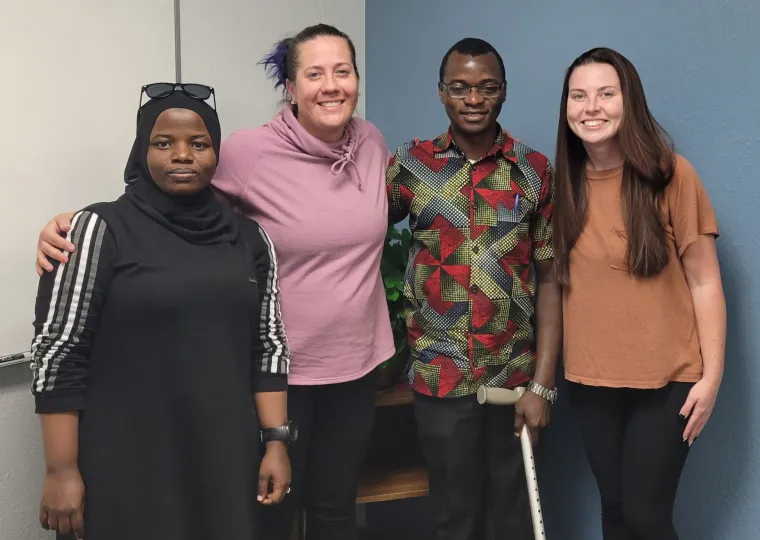
Pictured from left to right: Jalia Namiiro, Harunah's interpretter; Lindsay Janes from the Community Outreach Program for the Deaf; Harunah; and Lyssa Matsche from the Community Outreach Program for the Deaf. The group met to discuss Harunah's project, and during the meeting exchanged ASL and Ugandan sign and enjoyed exploring the differences and similarities.
“When I was growing up, I suffered an illness which led to the hearing impairment I have now,” he explained. “My parents back home came from a very humble background whereby they couldn’t afford many things. This did not discourage me from moving forward.”
While Harunah faced hardship, both from his family’s lack of funds and from naysayers, he also received support. The aid that Harunah received, both financial and emotional, as he went through school inspired him to give that same support to others.
“All the sponsorships I gained through my education, from when I acquired my disability through university, encouraged me and instilled a desire to inspire hope, especially for other persons with disabilities, that their dreams are still valid,” Harunah said. “While I was growing up with this condition, people told me ‘You can’t do this. You can’t do medicine — you can’t hear,’ but I felt I could do it. And I went for it.”
As he tells it, Harunah’s vision for United Persons with Disabilities came together when he met with an organization for spina bifida, which gave him the idea for an organization which could bring together many different persons with disabilities, not just a particular disability. By doing so, he could help them to enter into social enterprises so they can stand on their own financially.
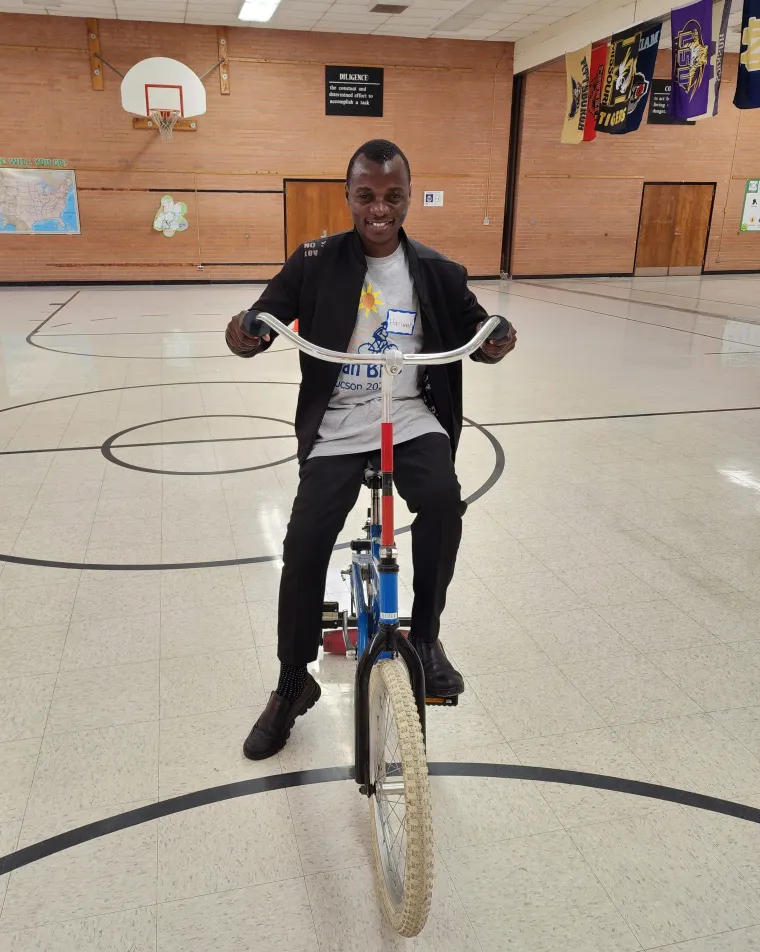
Harunah practicing riding a bicycle at a Tucson iCan Bike camp event where he volunteered to teach people aged eight and up with disabilities how to ride bicycles.
“After graduation, most of us are left behind and it’s hard to acquire jobs. So, it’s something that empowers us, especially financially so we are not left behind in our economic status. Back in the country, most persons with disabilities are marginalized,” Harunah describes.
United Persons with Disabilities is a disabled people's organization (DPO) that brings together persons with disabilities to engage in social enterprises. It aims to make people with disabilities financially independent. In trying to scale the work of United Persons with Disabilities to achieve more impact, the idea of the Saving and Credit Cooperation Society (SACCO) came to Harunah’s mind. A SACCO uses pooled funds to give loans to its members at reasonable rates of interest and offer financial services.
“I saw many graduates with disabilities after graduation who were unemployed, so I sought to help them because these people have ideas, skills, and experience, but they are unemployed, and the biggest challenge is the financial capital. I decided to form a SACCO, which is a savings and credit cooperative organization,” elaborated Harunah. “It’s quite unique in America but is common in Uganda, whereby people come together with capital from savings, with what little they can come up with, and after saving it they take back through loans. And these loans are taken on very little interest, which could help them transform economically, because they have the ideas, experience, and skills, and they have projects in mind but they lack financial support. So, if they come up with savings and take the loans they can put up their projects while we support them with counseling and financial interest.”
For Harunah, besides a lack of financial support, another prominent issue facing people with disabilities in Uganda is the lack of a cohesive disability community. Part of Harunah’s mission, both with United Persons with Disabilities and more broadly, is to bring the communities of various disabilities together into a single, unified voice that can influence policy and inform the public.
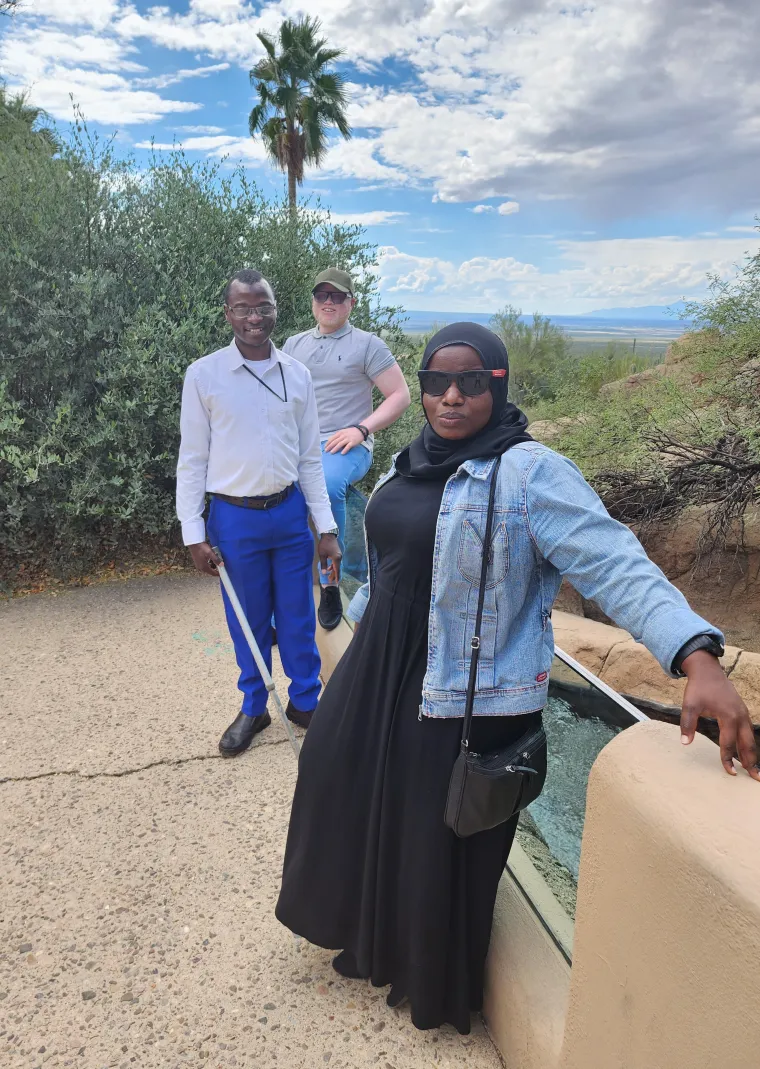
Pictured from left to right: Harunah Damba; Alan Herbert, another professional fellow, from Kenya, who has been conducting his fellowship at the University of Arizona Disability Resource Center; and Jalia Namiiro, Harunah's interpretter.
“The overarching need is the absence of a voice for persons with disabilities, and I feel persons with disabilities need to have a voice to influence things,” Harunah described. “Part of the reason for this is we lack inclusion and also lack capacity and cooperation among persons with disabilities themselves. I’m trying to bring us together so that we could speak with a uniform voice and get to voice our needs. I feel this will drive us on the road to empowerment and we’ll be able to work out all our needs.”
He hopes the leadership skills and connections he makes while in Arizona will help him take United Persons with Disabilities to the next level, possibly to an international scale.
“I hope to get the skills, experience, and tools that could shape me into a transformational leader with the ability to influence policies, and bring the work of the marginalized to international levels,” Harunah said.
To that end, the Professional Fellowship program has given him the opportunity to meet with disability advocates and professionals, and see first-hand how a disability advocacy organization like the Sonoran Center functions.
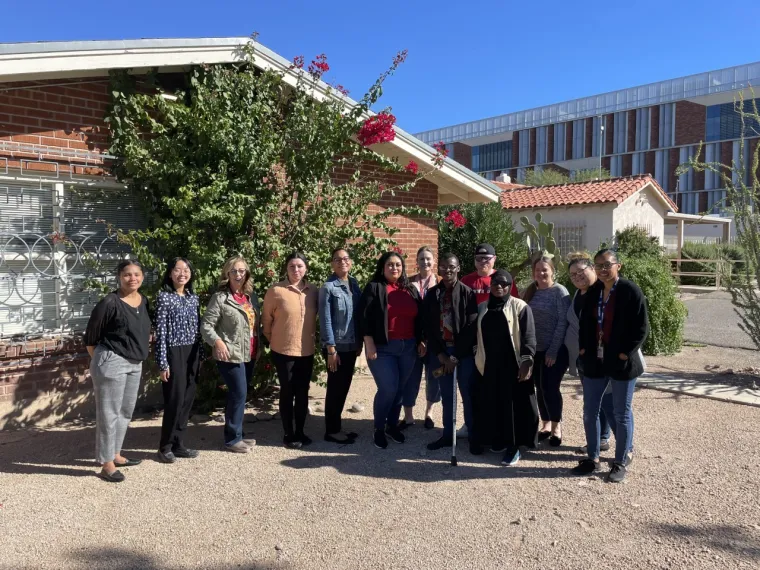
Sonoran Center staff posed with Harunah in front of the Sonoran Center after his farewell breakfast on October 28, 2022.
“My schedule of activities includes meeting with resourceful individuals, asking questions, and reviewing the available advice to work on my follow-up project. I have engaged in meetings one-on-one with some staff members from the Center,” Harunah said.
One such opportunity is the chance to sit in on Transition Ahead Roundtable meetings, in which the Sonoran Center works directly with kids and teens with disabilities to discover how they can turn their interests and strengths into viable career paths.
“My favorite part has been the Transition Ahead Roundtable meetings recently. I’m fascinated by the efforts the Center is putting in to uplift persons with disabilities,” Harunah said.
His schedule also includes mentoring sessions with the Sonoran Center’s director, Wendy Parent-Johnson, PhD. In a post on LinkedIn, Harunah explains how they discussed a “parallel inclusion system” that would give people with disabilities the opportunity to be seen and speak for themselves while maintaining their sense of community and solidarity. He points to Paralympics/adapted sports, employment transitioning opportunities and education for people with disabilities as examples of this currently in practice.
He has also used some of his time in Arizona to visit places like the Grand Canyon and the Sonoran Desert Museum.
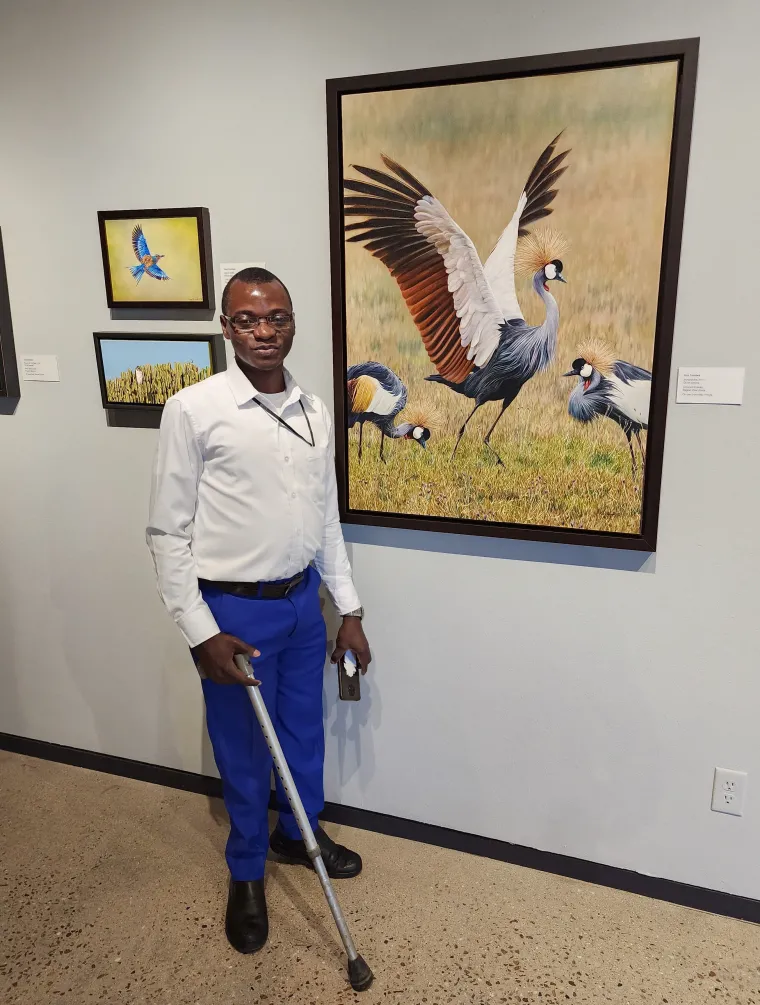
Harunah in front of a wildlife painting inside the Desert Museum.
“Recreation activities, sightseeing, and viewing cultural places greatly enrich my experience. I’m seeing how inclusive the environment is,” Harunah said.
In another LinkedIn post about his experience at the Desert Museum, Harunah described how his first encounter with desert-adapted plants, birds, and animals struck him as resembling the wildlife found in arid communities in the Northern part of Uganda.
“With this striking familiarity, I am so happy to have found a home away from home.”
The Professional Fellows Program on Inclusive Civic Engagement in Kenya, Tanzania, Uganda, and Ethiopia is a program of the U.S. Department of State, administered by the Institute for Community Inclusion (ICI) at the University of Massachusetts Boston in partnership with Humanity and Inclusion (HI).
